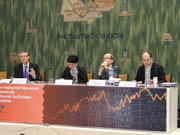UNI Finance first official meeting with Financial Stability Board

For the first time ever, the trade union movement managed to make its voice heard during a formal consultation with the Financial Stability Board organized by ITUC/TUAC and UNI in Geneva on the 16th of November. Only a limited number of trade union leaders had managed to meet with the FSB in previous years, asking for a broader consultation.
This time, around 60 trade union leaders came together from Asia, Africa, Europe, and the Americas to ensure that the social and employment dimensions would be effectively addressed by the FSB when preparing the Resolution and Recovery Plans for the 28 G-SIFIs, the Global Systemically Important Financial Institutions also called “too big too fails”. These 28 companies include some large banks such as HSBC, Deutsche Bank, Bank of America, which, in case of bailout, could jeopardize the stability of the global economy.
The FSB has been established to coordinate the work of national and international authorities to implement effective regulatory policies in the interest of global financial stability. The FSB also has the mandate to develop some “emergency” plans for large financial institutions to prevent future crisis. However, until now, the social and employment dimensions have been absent from these plans, which would have, in most cases, a significant impact on jobs.
For Philip Jennings, Secretary General of UNI Global Union, “the bank employees are the ones who are facing the anger of people losing their jobs and homes; the banks cannot keep their expectations of making a 15 to 20% return on equity when the rest of the economy is stagnating; the FSB has a big role to play to re-establish the morality of banking and secure investments into job creation and real economy.”
Sharon Barrow, the Secretary General of ITUC added that “the FSB has a very technical mandate but also needs to keep in touch with reality through regular consultation with civil society and trade unions; we are hoping that this meeting is the first one of a series.”
The assembly of trade union leaders asked the FSB to have a seat at the table of the executive board, be fully associated to the design of recovery plans, but also make pressure on the banks themselves to adopt more realistic targets, adjust their remunerations practices to stop incentivizing risk-taking behaviour, and engage their employees to change the banking culture.
Pierre Habbard also identified two grey zones in the FSB operations. " First, the employer’s responsibility is not very well defined, during the specific period of urgent action plans implementation. Second, the plans are very thin and the sources of funding are sufficient, considering the size of the financial companies. We would like to develop a specific chapter on employment which should be incoporated into the recovery plans".
Rupert Thorne, the FSB Deputy Secretary General concluded the meeting by saying that the FSB would make an effort to “be more transparent, hold regular consultation, receive contributions on on-going policy developments” and also “make the people who take risks pay for the risks they take”.

